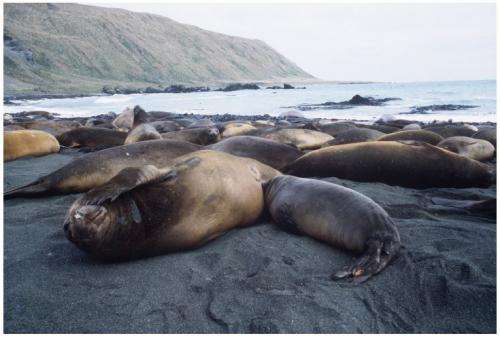Young new mum elephant seals face greater danger from motherhood

It's a tough life for first time mums in the animal kingdom: a new study on southern elephant seals from Macquarie Island has revealed the true costs of breeding.
Using data collected over 18 years on nearly 7,000 females, researchers from Macquarie University, the University of Tasmania, CEFE-CNRS, and the Universityof Oxford, show that young females have a lower chance of survival following their first breeding event compared to experienced breeders or non-breeders. Moreover, females starting to breed early, for example at age three, are even less likely to survive to the following year, than females first breeding at age four. Lead researcher Marine Desprez from Macquarie University says given the number of southern elephant seals at Macquarie Island has been in decline for many years, the loss of young female seals has grave ramifications. "The age at which individuals first reproduce is an important factor that may be the most important determinant of a female seal's lifetime reproductive output, which in turn can have major consequences on population dynamics.
"Elephant seals are apex predators, at the top of the food chain. They integrate the resources available within the southern ocean, making them critical indicators of the productivity and health of the ocean.
"Currently, their population is declining at a rate of 0.8% per year, and an earlier study estimated that since 1988, there has been a reduction of approximately 5400 breeding females."
Female elephant seals fast while they feed their pup, during a lactation period that lasts about 24 days. This quickly leads to a reduction in body mass, on average of 35%. They can lose up to a costly 8kg a day. Reproduction is even more costly for the young first-time mums because they are still growing when they first breed. Female elephant seals grow until six years of age, so at three are still young and generally smaller. Growing animals must allocate energy to both growth and reproduction, therefore only the strongest and healthiest first-time mums will survive their first breeding event.
"This study is a first step in understanding the long-term decline of the population of elephant seals at Macquarie Island. The more we understand the elephant seals life, the better we may be able to prevent their decline," said Marine.
More information: "Age-specific cost of first reproduction in female southern elephant seals," Biology Letters June 2014, Desprez, Marine; Macquarie University, Harcourt, Robert; Macquarie University, Hindell, Mark; University of Tasmania, Cubaynes, Sarah; University of Oxford, Gimenez, Olivier; CEFE-CNRS, McMahon, Clive; University of Tasmania, published online.
Journal information: Biology Letters
Provided by Macquarie University



















